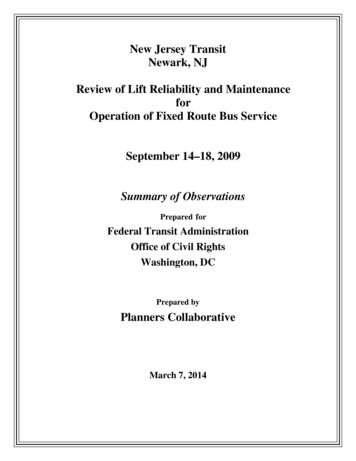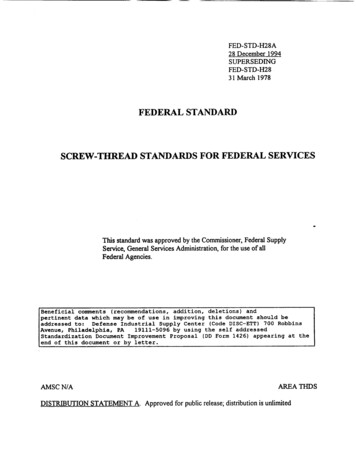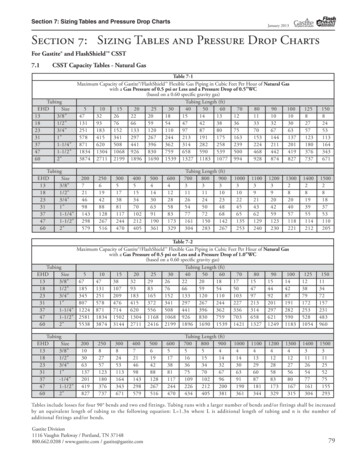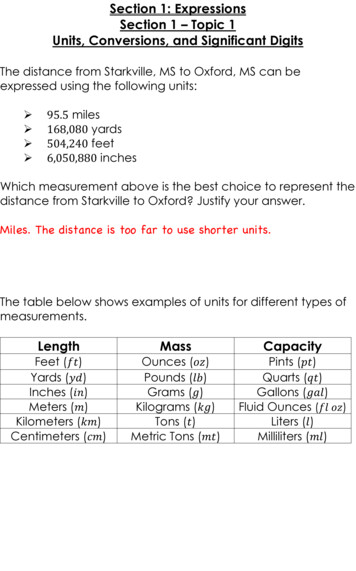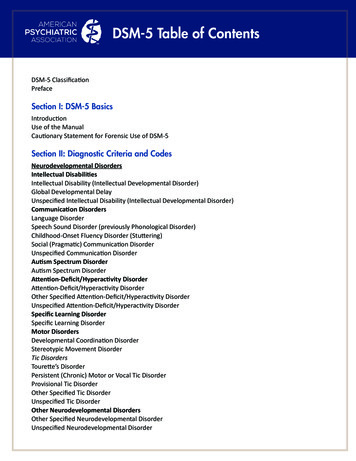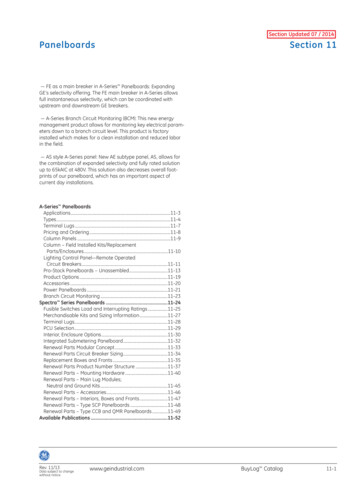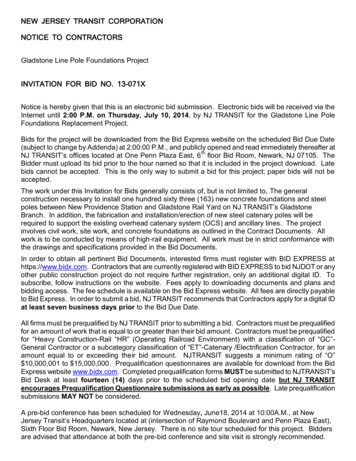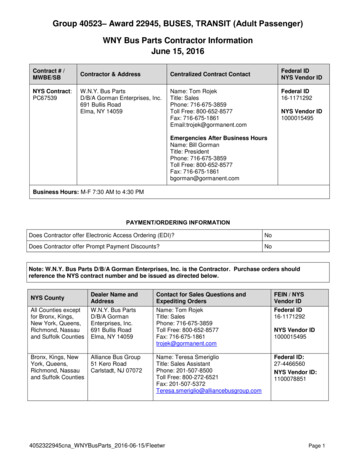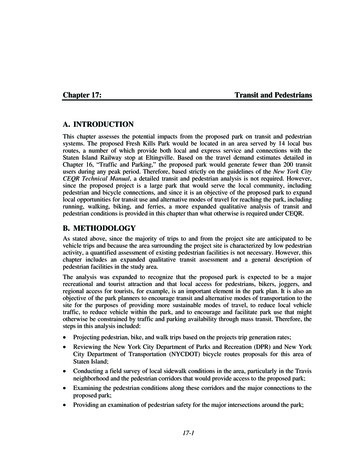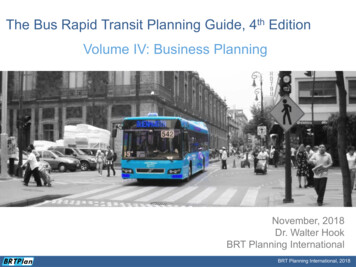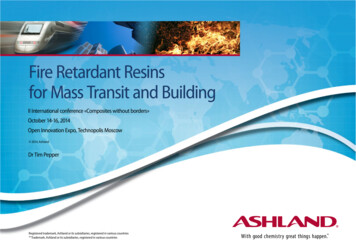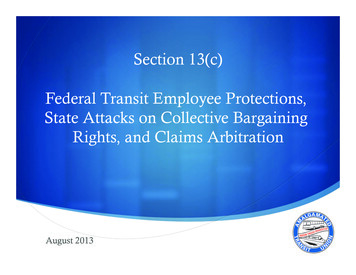
Transcription
Section 13(c)Federal Transit Employee Protections,State Attacks on Collective BargainingRights, and Claims ArbitrationAugust 2013 "
What is Section 13(c)? Special Transit Employee Labor Protections certified by theU.S. DOL as a precondition for public agencies to receivefederal funding Originally in Section 13(c) of the Urban MassTransportation Act of 1964 Now found at 49 U.S.C. Section 5333(b) of the FederalPublic Transportation Act
Why is Section 13(c) Important? Protects Existing Public/Private Sector CollectiveBargaining Rights – Mandatory and/or Traditional Subjectsof Bargaining Protects Jobs and Benefits Against Adverse Impacts fromFederal Funds Provides Resolution Procedure for Disputes over MakingCollective Bargaining Agreements and the Terms of theSection 13(c) Agreements
What does Section 13(c) Require?Public Transit Bodies Are Required to: Preserve transit employees’ rights and benefits; Continue transit employees’ collective bargaining rights; Protect transit employees’ against a worsening of their employment conditions; Assure jobs for employees of acquired mass transit systems; Provide priority of reemployment if an employee is laid offor his/her job is eliminated; and Provide paid training.
How Does the Section 13(c)Administrative Process Work?29 C.F.R. 215 Public Agencies Submits Grant Applications to Federal TransitAdministration (FTA) FTA Forwards the Grants to the Department of Labor (DOL)for Section 13(c) Certifications DOL Refers the Proposed Section 13(c) Protective Terms andConditions to Applicant and Union(s) Parties have 15 days to Agree or File Objections to the DOL’s ProposedTerms DOL Issues Final Determination on Objections and/orIssues Final Certification Action DOL Certification Required to Receive Federal Funds
State Attacks onCollective Bargaining Rights2010-2013
Wisconsin Act 10 eliminates most publicemployees right to bargain overanything but a restricted rangewages Bans “Fair Share” agency feeprovisions in collective bargainingagreements Compels public sector unions towin recertification annually by asuper-majority vote Bans payroll deduction ofmembership duesATU’s Response/Status Now ATU objected to limits on bargainingrights Wisconsin Act 32 passed whichexempts transit employees fromWisconsin Act 10
Michigan Local Financial Stability and Choice Act – PA436 Replaces the Accountability Act (aka EmergencyFinancial Manager Act) – PA 4 – which allowed forthe gubernatorial appointment of a manager in afinancial emergencyWhen a financial emergency is found to exist, thelocal government can choose to either sign aconsent agreement, have an emergency managerappointed, undergo a neutral evaluation process, orfile for Ch. 9 bankruptcyPA 54 freezes wages and benefits of employees atthe expiration of an existing collective bargainingagreement Requires employees to pay any increased costsassociated with insurance benefitsProhibits any retroactive wage or benefit levels PA 152 imposes hard cap or 80/20 split on healthcare costs PA 63 and PA 107 prescribes eligibilityrequirements regarding qualifying for revenuesharing incentives (EVIP) for cities, villages andtownships, which include an employeecompensation plan that would mandate employeeconcessions.ATU’s Response/Status Now ATU objects to limits on collective bargaining rights PA 4: DOL required letter of assurance that transit systems arenot in financial distress so as to trigger PA 4 PA 436: Legal Department currently reviewing its impact onSection 13(c) rights, especially in light of Detroitʼs filing forbankruptcy on July 18, 2013 PA 54: DOL ruled new law restricts the rights of publicemployees to engage in collective bargaining DOL directed the parties to engage in good faithnegotiations to resolve issues DOL secured AG ruling permitting 6 month contractextensions to avoid adverse effects Supplemental agreements negotiated with MI transitsystems in order to overcome limitations imposedby PA 54 PA 152: Transit agencies who have existing Section 13(c)agreements in place that are inconsistent with the new lawʼsmandates have the ability to “opt-out” under PA 152 PA 63 and PA 107: If a transit body is eligible for EVIP, it mustprovide assurance that it will not pursue employee concessions inorder to qualify.
New Jersey Public Law 2011, Ch. 78,mandates that activeemployees pay between 3%and 35% of the cost of healthbenefits based on salary andcoverage selectedMinimum contributions arephased in over four yearsATU’s Response/Status Now ATU objected to limits on bargainingrights DOL secured state attorney generalopinion that new law does not applyto NJT transit employees
Massachusetts Amendment to MBTA lawabolished health care plan andamended the retirement planTransferred MBTA employeesto the state GIC healthinsuranceRequired new hires to becomeeligible for a pension after 25years of service and no earlierthan reaching age of 55ATU’s Response/Status Now ATU objected to limits on bargaining rights onhealth care benefits DOL ruled new law removes mandatory and/or traditional subjects of bargaining whichviolates Section 13(c) Parties reached agreement to address adverseaffects. MBTA and unions negotiated a Healthand Welfare Trust Plan which providessupplementary health benefits and coverages.Additionally, legislation was passed allowingthe creation of the Plan DOL now approves all pending grants
Ohio SB 5 limits public employeebargaining to wages; excludeshealth care, sick time, orpension benefitsEliminates automatic payincreases and replaces themwith merit raises orperformance payBans strikes and reducesorganizing rightsATU’s Response/Status Now ATU objected to limits on bargainingrights DOL initially ruled that SB 5 does notaffect transit employees because ofspecial state law By referendum in November 2011, SB5 was defeated
California Public Employeesʼ Pension Reform Act(PEPRA) impacts new employees hiredafter January 1, 2013: Raises minimum retirement age (from55 to 62)ATU’s Response/Status Now Imposes new formulas for calculatingpension benefits (2% at 62) Requires contributions fromemployees to equal ½ of the normalcosts of plan ATU objects to limits on bargainingrights For existing employees: bansenhancements in benefits for pastservice; supplemental or replacementplans; and airtime purchases DOL initially ruled that new lawappears to remove mandatory and/ortraditional subjects of bargaining whichviolates Section 13(c) On August 1, 2013, DOL issued aletter to CA Governor Brown urging thepassage of an amendment to PEPRAexempting transit employees
Discussion Restructuring/Outsourcing: Contractor to Contractor Change Public to Private Operational Change Transferring Work to Other Contractor(s) Request for Proposals/Competitive Bidding Claims: Notice and Negotiations Arbitrations
file for Ch. 9 bankruptcy PA 54 freezes wages and benefits of employees at the expiration of an existing collective bargaining agreement Requires employees to pay any increased costs associated with insurance benefits Prohibits any retroactive wage or benefit levels PA 152 imposes hard cap or
